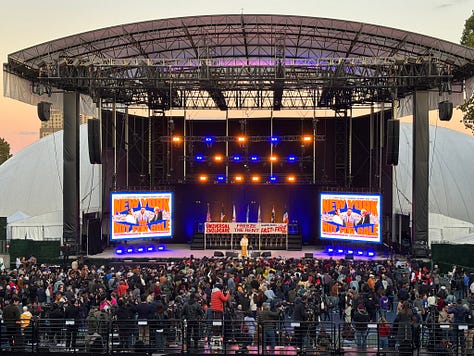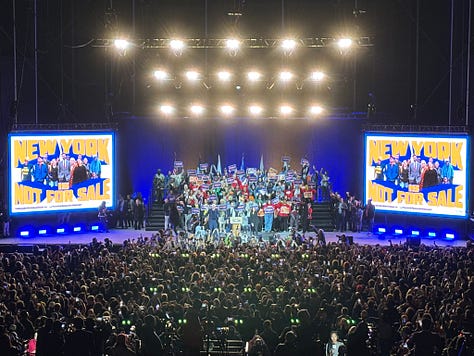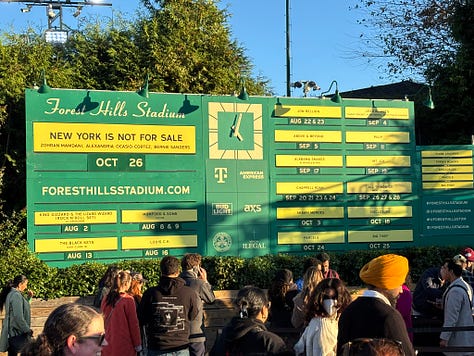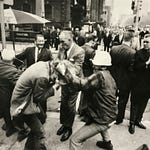On Sunday, we went to a 13,000-strong pre-election rally for Zohran Mamdani in Queens, New York. You can listen to our full discussion above. Below are excerpts, edited for clarity.
Zohran and DSA
Neal: One of the highlights of the night was that they had the New York City Democratic Socialists of America (NYC-DSA)’s elected officials on stage. These socialists in office came on stage in their red DSA shirts to talk to 13,000 people about the important role that NYC-DSA has played being an anchor for the Left in the city. Multiple times they asked people to join DSA, to get organized.
Nick: People have been worried about the extent to which Zohran is or is not really still a representative of DSA. I think this is a good sign that he still very much feels like a part of the organization, even if, as we’ve discussed a few times, he’s not willing to endorse the national DSA platform in its entirety.



Heckling With Substance
Nick: Not long after the DSA crew was up there, the leaders of the New York State Democratic Party came out on stage as a group: State Assembly Speaker Carl Heastie, State Senate Majority Leader Andrea Stewart-Cousins and, of course, Governor Kathy Hochul.
Neal: To me, that was the highlight of the night in many ways. I wasn’t expecting it to be. I think a lot of people, myself included, were a bit concerned that Kathy Hochul was speaking. She has been an adversary of the Left in the city and the state for a long time; she was even Andrew Cuomo’s successor as governor. She’s a Democrat, but she’s very much the quintessential corporate Democrat. Now she is endorsing Zohran after first resisting doing so.
I don’t know what she expected, honestly. She got up to give her speech about why we need to go vote for Zohran. It had no substantive content. But I think it was pretty clear right from the start when she started speaking that the audience was not gonna be with her — they were not going to have her back that night.
Nick: She definitely got a very chilly reception. Pretty quickly. someone started a chant of “Tax the Rich,” which broke out across the stadium. For folks who haven’t been following as closely, part of the interesting dynamic of the race and of Hochul’s endorsement of Mamdani is that Zohran has said he’s going to pay for these new social programs — free buses and universal childcare, building more affordable housing — through raising taxes on the rich. Now, the mayor does not have the authority to do that. He would need the legislature and the governor in Albany to propose that and sign off on it. Hochul has said, even as she has endorsed him, that she is not gonna support any new taxes. So that’s something the crowd was eager to pick up.
You can watch the substantive heckling below:
Neal: There were multiple points where people broke out chanting “Tax the Rich,” and I think you and I got pretty into it. The people around us were really into it. I was thinking about it too from the point of view of the people who were sitting near us. From talking to them, my sense was that a lot of them were not ideologically committed lefties. These were nice Democrats who were interested in the mayor’s race and thought Zohran was really cool, and they really liked what he stands for. Some of them had Kamala Harris buttons on.
I was thinking, what is their experience of this particular moment? From their reaction, it seemed like they were really getting into it. Because from the point of view of a lot of people, it’s a no-brainer: of course we need to tax the rich to achieve these things. It was a great moment to draw out that tension between the very progressive platform that Zohran is running on and then the role that Hochul may play trying to stop it.
Having that really clear chant — it wasn’t booing. I think it would have been kind of whatever, you know… politicians get booed or heckled sometimes. But this was a really substantive challenge to her.
Nick: Heckling with substance.
Neal: It’s almost like a dare. It’s like, “You’ve come here —now you need to take the next step. Are you serious about this? Yeah? Show us you’re serious.” And she did say at one point: “I hear you.”
Nick: We should explain how this all ended. The heckling or the “substantive challenge,” as Neal put it, continued throughout her remarks. People were really not giving her a positive reception. Eventually — and this has been picked up by the mainstream media as well — Zohran had to come out. He comes out onto the stage unexpectedly, and to applause, as you might expect. He goes up to her, shakes her hand, raises her hand in his, and then gently escorts her off the stage to applause and cheering. And some continued “Tax the Rich” chants. So that was a pretty hilarious denouement.
Neal: What I really like about that incident is that it does build the pressure on her. The next fight is, how do we fund these programs that Zohran is fighting for? It puts the pressure on her, and she has to get reelected next year. So she’s got to try to convince a lot of these people who became excited about Zohran’s campaign to support her. She knows the pressure is there.
Also, Zohran knows the pressure is there. He can see from his own base that he’s helped build what they want. They know what is necessary to achieve the agenda.
The Democratic Base’s March to the Left
Nick: Hochul was obviously reluctant to endorse Zohran. She didn’t endorse until September, pretty late after he’d won the Democratic primary. She is, as we’ve emphasized, not a progressive; she’s very much in the corporate wing of the Democratic Party. But she’s clearly seeing where the wind is blowing somewhat in terms of the base of the party and the popularity of Zohran, his meteoric rise. She’s trying to capture some of that energy and momentum.
I would probably agree with you, Neal, that she is going to try to do the minimum possible substantively to try to capture that momentum. But to the extent that he and his base puts pressure on her, there’s an opening to try to get her to do more. A few weeks ago, she came out and said, actually, I am for universal childcare. Of course, she’s still saying she’s not going to tax the rich, which is what we need to fund it.
And did you see the reporting the day after the rally? She gave some speech where she said something like, “I don’t want to raise taxes, but you know, I’m hearing from a lot of people. I’ve got to make calculations.” She’s expressing some tentative openness to raising taxes. And Zohran has wisely not said yet that he is endorsing her for reelection, when he was asked about it in one of the general election debates.
So there is a question of how far we can move Hochul and other establishment Democrats. None of these people are our friends, of course. But under pressure, even politicians who are opposed to socialist politics will sometimes give in.
Neal: This gets to the fact that these important leaders in the Democratic Party are being forced to move with the course of events against their will. That gets at another interesting aspect of the rally, which is that this was a coming together of the three most prominent democratic socialist leaders in the country: Bernie, AOC, and Zohran. You have a recent Jacobin article, Nick, where you talk about the moment we’re living in now, where this group is becoming the face of the national opposition to Trump.
Nick: The Democratic Party on the whole has not had a coherent oppositional message or strategy. Very early on in Trump’s term, the Democratic strategist James Carville advised the Democrats to roll over and play dead — basically do nothing, let Trump and the GOP dig their own grave with their bad economic policies and other stupid political decisions. And the Democrats have been mostly doing that.
The current government shutdown is perhaps an exception. Or it shows that party leaders like Schumer are responding to some pressure from the base to try to take a more aggressive, oppositional stance. But I don’t think they’ve been messaging very clearly about what the shutdown is really about. They’re complaining about Republicans refusing to negotiate.
Whereas Bernie and AOC from pretty early on have been barnstorming the country, making opposition to Trump’s authoritarianism also about fighting oligarchy, fighting economic inequality, taking on the billionaire class — people like Elon Musk who are opposed to working people, who are opposed to having economic security and a good standard of living, affordable healthcare, all of those sort of bread-and-butter concerns.
They’ve been very forthright in opposing Trump’s authoritarianism and articulating an economic populist message that can appeal to people, especially a lot of the people who have been fed up with Democrats, who have not been voting for Democrats in recent years. That aligns very well with what Mamdani is doing in New York. Focusing on affordability, saying we need to tax the rich so that we can build out social programs that allow working-class New Yorkers to have a dignified life here and continue to be able to afford to live here.
Zohran, AOC, Bernie: they’re the ones who actually have a substantive, appealing anti-Trump message to offer. A strategy for winning back disaffected voters. The Democratic establishment doesn’t really have anything to say other than, of course, Trump is bad.
Neal: One of the interesting things too that the rise of Bernie, AOC, and now Zohran to this leadership role demonstrates is the fact that the base of the party has been transformed quite a bit. I don’t think any of us could have predicted five or six years ago the degree to which the Democratic Party base has been pushed pretty substantially to the left by the shortcomings of the Biden administration and the different popular mobilizations that have happened in the last five years around Black Lives Matter and Palestine — and also the horrible situation we find ourselves in now with the Trump government and the failure of the Democratic Party leadership to present any real alternative.
All of these factors have come together to create a base of the Democratic Party that is significantly to the left of where it was, even in the 2020 presidential election. You’ve got to remember, Bernie did OK in the 2020 presidential primary, but his presidential campaign wasn’t a smashing success.. It was a success for many reasons from our point of view: He really popularized the message. DSA and other organizations and labor projects grew out of it, which was very important. But he didn’t unite the party base around his campaign, far from it.
I’m curious what you think, but to me it feels like there has been a sea change in the base of the party in the last five years, especially in the last year. Something is going on inside the Democratic Party now. I don’t know how deep it is or how permanent it is, but it definitely feels like the party base is much to the left of where it had been in the past.
Nick: I don’t think I’ve looked at all of the relevant data to suss that out sufficiently, but definitely it seems like people like Bernie Sanders and AOC are very popular among the base. Zohran is probably not super well known outside of New York City, but in New York City at least, he is very popular among the base, and it seems among some nontraditional voters as well.
An Era of Ambitious Government
Neal: Zohran at one point said, “My friends, the era of government that deems an issue too small or a crisis too big must come to an end.” That’s obviously a reference to Bill Clinton in the 1990s, when he said that “the era of big government is over.” I think Zohran was clearly thinking about that and trying to present some sort of rhetorical rebuttal to it. I don’t think they have a pithy way of saying it yet. They should have said something like “the era of ambitious government is here.”
Nick: Right, they’re still workshopping the exact language perhaps. But that’s definitely what I thought when I heard that. This was an attempt to invert this idea that Clinton expressed as part of the ascendance of Third Way liberalism. Clinton was basically expressing the post-Reagan consensus that Democrats or liberals could no longer be proud defenders of ambitious government action or an aggressive public sector.
It’s very heartening to see Mamdani taking up this theme that we want to see government as a solution to our problems and that we want to expand the public sector and reimagine what the public sector is capable of. That has been a through line in his campaign: Building out public housing as a big part of the solution to the New York housing crisis, obviously the experiment with city-owned grocery stores, making buses fast and free, universal childcare. All of that is really about expanding the public sector, bringing the “era of big government is over” to an end.
Neal: That is the key socialist element of Zohran’s campaign: The push for defending the public sector and for building a stronger public sector. Moving away from these “public-private partnerships” that ultimately end up subsidizing private companies to try to deliver social goods.
The campaign is saying: “We don’t rely on that anymore.” We rely on municipally owned grocery stores. We rely on municipally provided childcare services. These things, I think, are a super important part of the socialist promise of Zohran’s campaign. Show that the public sector and maybe worker co-operatives can be an alternative to the private sector, to capitalist enterprises. It really makes me very hopeful about what’s possible in the future for articulating a positive vision of what democratic socialist politics is all about.
Nick: It’s common for people to collapse the distinction between progressivism and democratic socialism. There’s not always a clear, bright line between progressive politics or progressive policy versus democratic socialist policy or politics. We’ve often talked about it as democratic socialists having a different end goal, of more collective ownership or control of the economy.
Zohran — even as he tries to broaden his appeal beyond the hardcore DSA base — still foregrounds this public sector primacy in his pitch. And that the way we’re gonna pay for this is by taxing the rich and by taking on the billionaire class. That’s part of his campaign message; that class-struggle message is still really there.
He says: “The era of government that deems an issue too small or a crisis too big must come to an end. Because we need a government that is every bit as ambitious as our adversaries.” I find that really significant. The goal of government is not just to help people or improve people’s lives. It is of course about that, maybe primarily about that, but he also sees it as a matter of, we have to use the government to take on our adversaries. Which is channeling a kind of class-struggle spirit that we love to see.
Neal: Absolutely. Combine a robust plan for expanding the public sector, a plan to make the rich pay for these programs, and then — there are real limits to what you can do here as a city government, but still — a plan for strengthening the labor movement. I think you’ve got a really powerful democratic socialist message for municipal politics right there. This campaign is sort of stumbling into this vision of what a real municipal socialist politics can look like in the next ten, fifteen years.







